The rapid growth of Airbnb and the short-term rental industry has transformed the hospitality landscape, offering travelers more options and homeowners new revenue streams. However, this disruption has also sparked a heated debate over the legality of certain rental practices. The controversy surrounding illegal rentals on Airbnb has become a complex and multifaceted issue, with far-reaching implications for hosts, communities, and the platform itself.
At the heart of this debate are the cases of hosts who have unknowingly or intentionally violated local laws and regulations governing short-term rentals. From New York City’s crackdown on illegal listings to San Francisco’s regulatory actions, the consequences for these unlawful rentals have ranged from hefty fines to eviction and the loss of future rental opportunities. These high-profile cases have shone a spotlight on the legal framework governing short-term rentals, as well as the challenges faced by both hosts and local authorities in navigating the evolving landscape of Airbnb and the sharing economy.
Key Takeaways
- The rapid growth of Airbnb has led to a surge in illegal short-term rentals, with significant legal and financial consequences for hosts.
- Local and federal regulations governing short-term rentals are complex and often at odds with Airbnb’s business model, leading to legal battles and crackdowns.
- Illegal rentals on Airbnb have broader implications for housing affordability, local businesses, and public services in affected communities.
- Airbnb’s role in addressing illegal listings and compliance with local laws is a central issue, with varying perspectives from hosts, guests, and governments.
- The controversy over illegal Airbnb rentals highlights the need for a balanced approach that supports the sharing economy while also protecting the rights and needs of local residents.
Introduction to Illegal Rentals on Airbnb
The rise of the sharing economy has transformed the hospitality industry, with platforms like Airbnb leading the charge. However, the rapid growth of short-term rentals has also brought about a surge in illegal rentals, creating a complex web of legal disputes and Airbnb regulations.
Overview of Airbnb's Business Model
Airbnb’s peer-to-peer rental platform connects hosts who have spare rooms, apartments, or homes with travelers seeking unique accommodations. This model has democratized the hospitality industry, offering more choices and often more affordable options compared to traditional hotels.
Definition of Illegal Rentals
In the context of short-term lodging, illegal rentals refer to properties that do not comply with local zoning laws, housing regulations, or licensing requirements. These rentals may operate without proper permits, exceed occupancy limits, or violate other municipal codes designed to protect residents and the community.
Scope of the Issue
The prevalence of illegal rentals on Airbnb has become a global phenomenon, with cities around the world grappling with the challenges of balancing the benefits of the sharing economy with the need to preserve housing affordability and neighborhood character. The scale of the issue highlights the tension between the disruptive innovation of platforms like Airbnb and the existing legal frameworks that govern the hospitality and real estate industries.
| Key Findings on Illegal Rentals | Statistic |
|---|---|
| Percentage of Airbnb listings found to be illegal in New York City | Up to 55% |
| Estimated annual revenue lost by cities due to unpaid hotel taxes from illegal rentals | $450 million |
| Increase in rental prices in some cities due to the growth of short-term rentals | Up to 20% |
These statistics illustrate the scale and impact of the illegal rentals issue, underscoring the need for a comprehensive approach to address the legal disputes and regulatory challenges surrounding short-term rental platforms like Airbnb.
Legal Framework Governing Short-Term Rentals
The legal landscape surrounding short-term rentals, such as those facilitated by Airbnb, is a complex and ever-evolving patchwork of federal, state, and local regulations. Understanding this multilayered framework is crucial for navigating the challenges and controversies surrounding short-term rental laws, Airbnb legal battles, and rental enforcement challenges.
Federal Regulations
At the federal level, short-term rental activities are largely unregulated, with the exception of certain tax-related requirements. The Internal Revenue Service (IRS) requires Airbnb hosts to report their rental income, and some federal housing laws may impact the legality of certain short-term rental arrangements.
State and Local Laws
The real complexity arises at the state and local levels, where a diverse array of laws and regulations govern short-term rentals. Many states have enacted legislation to either enable or restrict Airbnb-style rentals, with some mandating registration, licensing, or tax collection requirements. Local jurisdictions, such as cities and counties, often have zoning laws and housing ordinances that further regulate the short-term rental market, leading to a patchwork of rules across different regions.
Zoning Laws and Housing Regulations
Zoning laws and housing regulations play a crucial role in determining the legality of short-term rentals. Some areas prohibit or heavily restrict the conversion of residential properties into transient accommodations, while others may have specific zones or permits required for short-term rental operations. These regulations can significantly impact the ability of Airbnb hosts to offer their properties for rent, leading to rental enforcement challenges and Airbnb legal battles in various communities.
| Jurisdiction | Short-Term Rental Regulations |
|---|---|
| New York City | Airbnb rentals are illegal in most residential buildings, with some exceptions for certain shared living arrangements. |
| San Francisco | Hosts must register with the city, comply with zoning rules, and pay hotel taxes. Unregistered short-term rentals are subject to fines and enforcement actions. |
| Chicago | Hosts must obtain a vacation rental license and comply with regulations, including limits on the number of rental units per building. |
As the short-term rental laws and Airbnb legal battles continue to evolve across the country, understanding the complex legal framework governing these activities is crucial for hosts, guests, and policymakers alike.
High-Profile Cases of Illegal Rentals
The rise of short-term rental platforms like Airbnb has led to a wave of legal disputes and regulatory crackdowns in major cities around the world. Some of the most high-profile cases of illegal rentals on Airbnb have had significant consequences for both hosts and local communities.
The New York City Crackdown
New York City has been at the forefront of the battle against Airbnb hosts operating in violation of local laws. In 2016, the city passed legislation imposing hefty fines on hosts who listed entire apartments for short-term rentals, a practice that was deemed illegal in many residential areas. This prompted a series of lawsuits and raids, with the city aggressively targeting unlawful Airbnb listings and imposing millions in penalties on non-compliant hosts.
San Francisco's Regulatory Actions
Similarly, San Francisco has taken a firm stance against illegal Airbnb rentals. The city enacted strict regulations requiring hosts to register with the local government and follow a set of rules, including limits on the number of days a property can be rented out. Failure to comply has led to significant fines and, in some cases, the removal of listings from Airbnb’s platform.
Notable Lawsuits Against Airbnb Hosts
- In 2019, a New York City Airbnb host was ordered to pay $1.2 million in fines and damages for illegally renting out an apartment in a residential building.
- A San Francisco host was sued by the city in 2018 for operating an illegal hotel, resulting in a settlement that required the host to pay $276,000 in penalties.
- In 2020, a Boston Airbnb host was fined $15,000 for failing to register their property and comply with the city’s short-term rental regulations.
These high-profile cases have set important legal precedents, underscoring the consequences for hosts who disregard local laws and regulations governing short-term rentals. As the cases and consequences of legal disputes over Airbnb legal battles continue to unfold, cities are reinforcing their commitment to maintaining a fair and regulated short-term rental market.
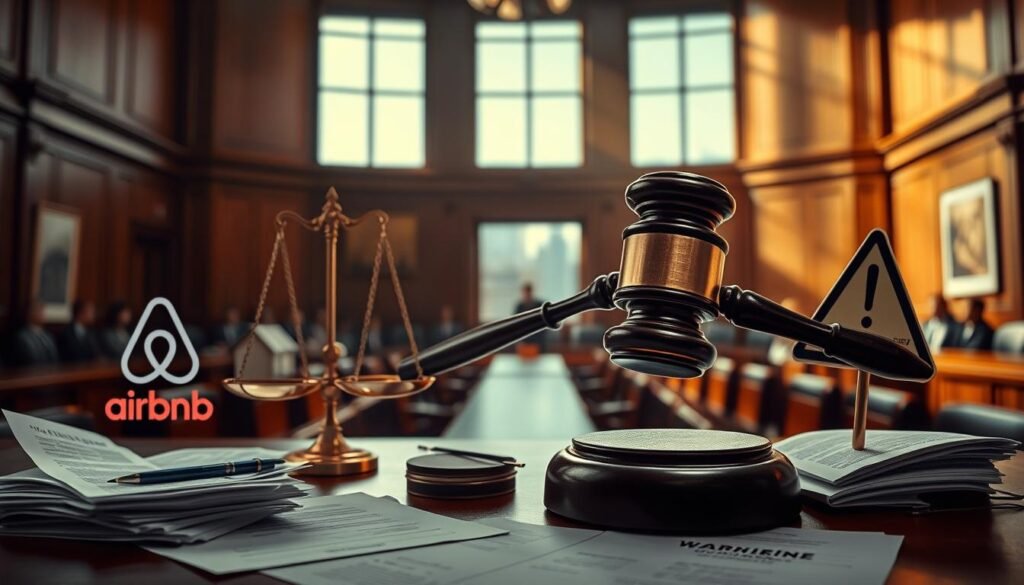
Consequences for Hosts
Hosting illegal rentals on platforms like Airbnb can have severe consequences for the hosts themselves. From legal penalties and hefty fines to the risk of eviction and long-term impact on future rental opportunities, the ramifications can be far-reaching.
Legal Penalties and Fines
Engaging in unlawful short-term rentals can result in substantial legal penalties and fines for hosts. Depending on the jurisdiction, hosts may face steep monetary sanctions, ranging from hundreds to thousands of dollars per violation. These penalties are often intended to deter illegal rental activity and recoup lost revenue for local governments.
Eviction Risks and Housing Instability
Hosts who violate their lease agreements or local housing regulations by operating illegal rentals face the threat of eviction. This can lead to a troubling cycle of housing instability, as hosts may struggle to find alternative rental opportunities in the future due to their legal disputes and rental violations.
Impact on Future Rental Opportunities
The consequences of illegal rentals can extend beyond immediate penalties, as hosts may find their future rental prospects severely limited. Landlords and property managers may become wary of working with hosts who have a history of rental violations, making it increasingly difficult to secure legal and compliant rental agreements moving forward.
| Consequence | Description | Potential Impact |
|---|---|---|
| Legal Penalties and Fines | Monetary sanctions imposed by local authorities for illegal rental activities | Hundreds to thousands of dollars per violation, creating financial hardship for hosts |
| Eviction Risks and Housing Instability | Hosts facing eviction due to violations of lease agreements or housing regulations | Loss of current housing and difficulty securing future rental opportunities |
| Impact on Future Rental Opportunities | Hosts’ history of rental violations making it challenging to secure legal and compliant rental agreements | Reduced access to legitimate rental options, further exacerbating housing instability |
The consequences of engaging in rental violations and legal disputes over illegal rentals can be severe, with hosts facing a range of cases and consequences that can profoundly impact their financial stability and long-term housing prospects.
Implications for Communities
The proliferation of illegal Airbnb rentals has significant implications for local communities, affecting housing affordability, disrupting small businesses, and straining public services. As the local housing market impact of these short-term rentals becomes increasingly apparent, communities are grappling with the complex balance between tourism benefits and resident needs.
Effects on Housing Affordability
The conversion of residential properties into vacation rentals reduces the supply of long-term housing, driving up housing costs and making it more difficult for local residents to find affordable homes. This trend can lead to the displacement of lower-income families and the gentrification of neighborhoods, further exacerbating the community opposition to illegal Airbnb listings.
Local Business Impact
The influx of overtourism effects from illegal Airbnb rentals can disrupt traditional hospitality businesses, such as hotels and bed-and-breakfasts, as well as other local enterprises that cater to residents. The competition from unregulated short-term rentals can undermine the stability and growth of these established businesses, leading to job losses and a decline in the overall economic vitality of the community.
Strain on Public Services
The increased transient population in residential areas due to illegal Airbnb rentals can also strain local public services, such as law enforcement, waste management, and emergency response. Neighborhoods may experience higher levels of noise, traffic, and other disruptions, necessitating greater resource allocation and coordination from municipal authorities to maintain the quality of life for residents.
As communities grapple with the complex implications of illegal Airbnb rentals, policymakers and stakeholders must find ways to balance the benefits of short-term rentals with the need to protect the long-term well-being and affordability of local neighborhoods.
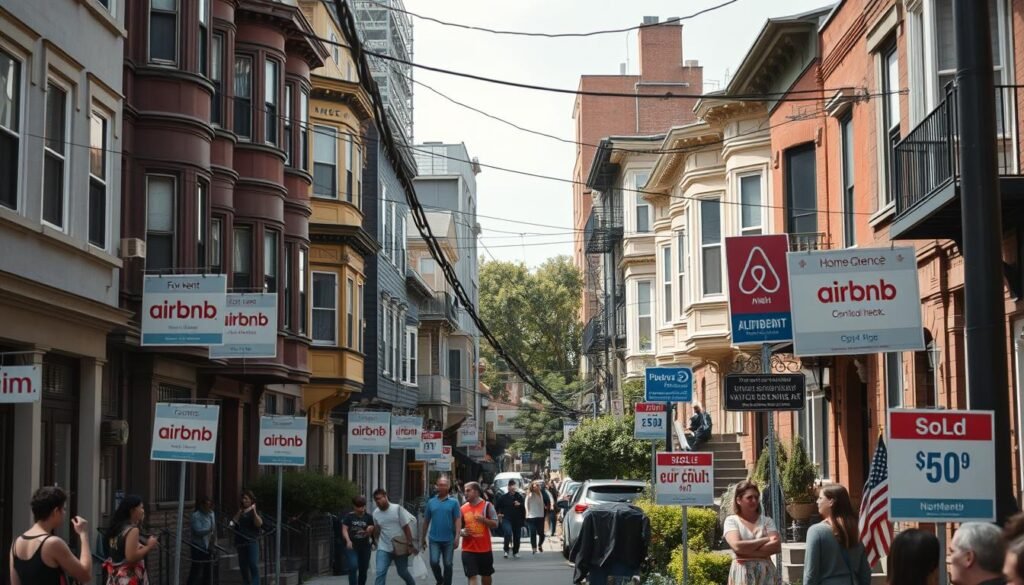
Perspectives from Local Government
As the debate around Airbnb regulations intensifies, local governments play a pivotal role in addressing the challenges posed by illegal rentals. Municipalities across the globe have implemented various strategies to strike a balance between promoting tourism and safeguarding the needs of their residents.
Regulatory Responses to Illegal Rentals
Many cities have taken a proactive approach by developing comprehensive regulations governing short-term rentals. These measures often include registration requirements, occupancy limits, and restrictions on the number of days a property can be rented. Enforcement efforts, such as conducting inspections and issuing fines, aim to ensure compliance with these Airbnb regulations.
Balancing Tourism and Resident Needs
Local governments must navigate the delicate balance between catering to the demands of the tourism industry and preserving the quality of life for their constituents. Some cities have implemented zoning laws that restrict the concentration of short-term rentals in certain neighborhoods, mitigating the rental enforcement challenges and the impact on the local housing market.
Case Studies of Successful Policies
Across the globe, various municipalities have implemented effective policies to address the issue of illegal Airbnb rentals. For instance, Amsterdam’s comprehensive registration system and San Francisco’s strict enforcement measures have demonstrated the potential for successful regulation. These case studies provide valuable insights for other cities seeking to navigate the complex landscape of short-term rental regulations.

As the Airbnb phenomenon continues to evolve, local governments must remain vigilant and adaptive in their approach to managing illegal rentals. By striking the right balance between tourism and resident needs, municipalities can ensure the sustainable growth of the sharing economy while protecting the fabric of their communities.
Perspectives from Hosts
As the controversy surrounding cases and consequences of illegal rentals on Airbnb continues, it’s essential to explore the perspectives of the hosts themselves. These individuals, driven by a range of financial motivations, often find themselves caught in the middle of the community opposition and rental violations debate.
The Story of a Distressed Host
Take the case of Sarah, an Airbnb host who had been renting out her spare room for the past few years to supplement her income. “I never thought I was doing anything wrong,” she explains. “The extra money helped me pay my bills and make ends meet.” However, Sarah’s dream of being a successful Airbnb host quickly turned into a nightmare when she received a hefty fine from the local authorities for violating zoning laws.
Financial Motivations Behind Illegal Rentals
- Supplemental income: Many hosts turn to Airbnb as a way to earn extra money, often to cover the rising cost of living or unexpected expenses.
- Mortgage and rent assistance: For some, the income from Airbnb rentals can make the difference between being able to afford their homes or not.
- Entrepreneurial aspirations: Some hosts see Airbnb as a platform to launch their own hospitality businesses, leading them to push the boundaries of local regulations.
Community Opinions on Airbnb Hosting
The presence of Airbnb rentals in residential neighborhoods has often sparked heated debates within local communities. While some residents welcome the economic benefits and cultural exchange, others express concerns about the impact on housing affordability, noise levels, and the overall character of their neighborhoods.
“Airbnb has turned our quiet street into a revolving door of strangers. It’s disruptive and makes me feel like I don’t have control over my own community anymore.”
Understanding the diverse perspectives of Airbnb hosts is crucial in navigating the complex landscape of cases and consequences, community opposition, and rental violations surrounding the short-term rental market.

Guests' Experience with Illegal Rentals
As the short-term rental market continues to grow, the issue of illegal rentals on platforms like Airbnb has come under increased scrutiny. Guests who unwittingly book such properties may find themselves exposed to a range of risks and unintended consequences.
Risks of Staying in Illegal Rentals
Guests who book illegal Airbnb rentals may face a variety of potential risks, including substandard living conditions, lack of safety features, and even legal issues. These properties often operate in the shadows, sidestepping local short-term rental laws and bypassing the necessary safety and licensing requirements.
Reviews and Reputation Impacts
The impact of illegal rentals extends beyond the individual guest experience. When guests stay in these unlawful properties, they may leave negative reviews that can tarnish the reputation of the host and the overall Airbnb platform. This, in turn, can have a ripple effect on the local housing market and hospitality industry, as guests become more wary of booking through Airbnb.
Impact on Local Hospitality Industry
- Illegal rentals can undermine the traditional hospitality industry, as they often offer lower prices and fewer regulations than licensed hotels and inns.
- This overtourism effect can lead to a decline in occupancy rates and revenue for legitimate hospitality businesses, potentially forcing some to close their doors.
- The lack of oversight and regulation in the short-term rental market can also create an uneven playing field, making it difficult for local businesses to compete effectively.
As the debate around illegal rentals and their impact continues, it is crucial for guests, hosts, and policymakers to work together to ensure a fair and sustainable short-term rental landscape that balances the needs of travelers, residents, and local businesses.

The Role of Airbnb in Regulation
As the popularity of short-term rentals continues to grow, the issue of illegal listings on platforms like Airbnb has become a pressing concern. Airbnb, as a leading player in the vacation rental market, faces increasing pressure to address the challenges of rental enforcement and ensure compliance with local laws.
Airbnb's Policies on Illegal Listings
Airbnb has taken steps to address the issue of illegal rentals on its platform. The company has implemented policies to identify and remove listings that violate local regulations, such as requiring hosts to provide information about their legal status and registration. Airbnb also works with local authorities to share data and cooperate on enforcement efforts.
Compliance with Local Laws
Navigating the complex web of Airbnb regulations and rental enforcement challenges is a significant challenge for the company. Airbnb has faced legal battles in various jurisdictions, where it has been accused of enabling illegal short-term rentals and undermining local housing policies. The platform has sought to address these issues by working with local governments to develop compliance frameworks and ensure that hosts operate within the bounds of the law.
Transparency and Communication Initiatives
To improve transparency and communication around rental enforcement challenges, Airbnb has launched various initiatives. This includes providing more detailed information to hosts and guests about local regulations, as well as engaging in dialogue with community stakeholders to address their concerns. The company has also pledged to work more closely with authorities to address Airbnb legal battles and ensure responsible hosting practices.

As the short-term rental industry continues to evolve, Airbnb’s role in addressing the issue of illegal rentals will remain a crucial aspect of its business model. By striking a balance between growth and regulatory compliance, the platform can navigate the complexities of the Airbnb regulations and contribute to the development of sustainable short-term rental ecosystems.
Global Perspective on Airbnb Regulations
As the short-term rental market continues to evolve, regulators around the world are grappling with the challenges of Airbnb regulations and rental enforcement. From Europe to Asia-Pacific, governments are implementing a variety of approaches to address the impact of short-term rental laws on their communities.
Comparison with European Regulations
In Europe, countries like Spain and Germany have taken a more restrictive stance on short-term rental laws, imposing strict licensing requirements and limitations on the number of days a property can be rented. Conversely, nations like the United Kingdom have adopted a more hands-off approach, allowing Airbnb regulations to be largely self-governed by the platform.
Practices in Asia-Pacific Markets
The Asia-Pacific region has seen a diverse range of rental enforcement strategies. Countries like Japan and South Korea have implemented registration systems for short-term rental laws, while others, such as Australia, have focused on empowering local authorities to manage Airbnb regulations.
Global Trends in Short-Term Rentals
Across the globe, policymakers are grappling with the delicate balance between promoting short-term rental opportunities and mitigating the negative impacts on housing affordability and community livability. As the industry continues to evolve, experts anticipate a growing emphasis on collaboration between platforms, hosts, and local governments to develop rental enforcement strategies that address the unique needs of each region.
| Region | Regulatory Approach | Key Challenges |
|---|---|---|
| Europe | Restrictive licensing and day limits | Balancing tourism and housing affordability |
| Asia-Pacific | Registration systems and local authority empowerment | Adapting regulations to diverse market conditions |
| Global | Collaboration between platforms, hosts, and governments | Developing comprehensive Airbnb regulations |
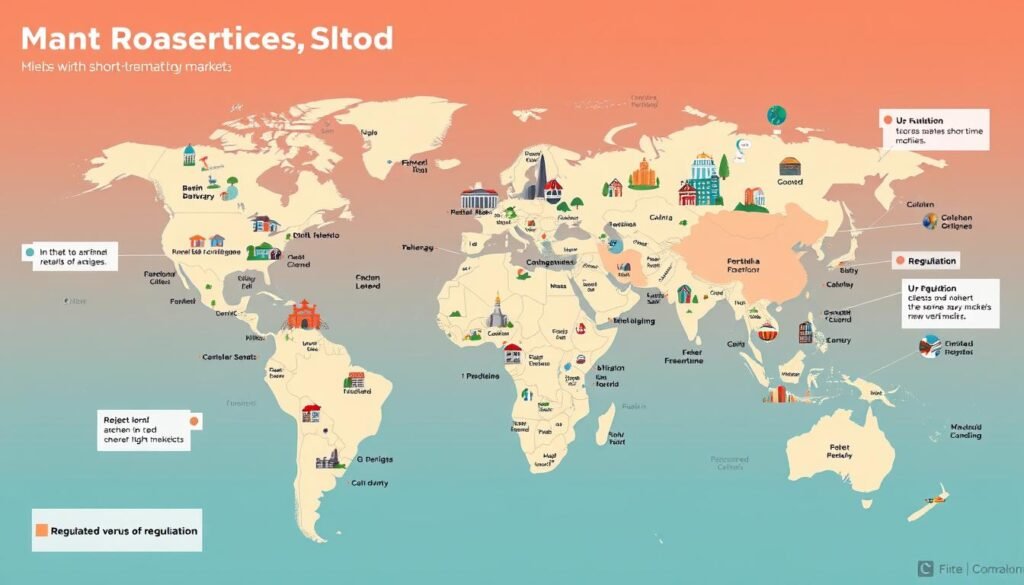
“As the short-term rental market continues to evolve, regulators around the world are grappling with the challenges of Airbnb regulations and rental enforcement.”
Economic Impact of Illegal Rentals
The rise of illegal short-term rentals on platforms like Airbnb has had far-reaching economic implications for local communities. While these rentals may contribute to local economies through increased tourism and spending, they have also led to significant revenue losses and economic disparities across regions.
Contribution to Local Economies
Illegal Airbnb rentals can provide a boost to local economies by attracting more visitors and driving up demand for ancillary services such as restaurants, shops, and transportation. This can lead to increased tax revenue and job creation in the hospitality and tourism sectors. However, the unregulated nature of these rentals often means that the economic benefits are not evenly distributed, with some communities experiencing more significant gains than others.
Revenue Lost to the Unregulated Market
The proliferation of illegal short-term rentals has also resulted in substantial revenue losses for local governments. These unlicensed properties often avoid paying the necessary taxes, fees, and registration requirements, depriving municipalities of critical funding for public services and infrastructure. This missed revenue can lead to budget shortfalls and a widening of the gap between the regulated and unregulated rental markets.
Economic Disparities Across Regions
The impact of illegal Airbnb rentals on local economies can vary significantly across different regions. Affluent neighborhoods and tourist hubs are more likely to experience a surge in short-term rentals, leading to increased housing costs and the displacement of long-term residents. In contrast, less desirable or economically disadvantaged areas may see fewer economic benefits from the influx of visitors, exacerbating existing inequalities and social divisions.
| Metric | Impact on Local Economies | Impact on Housing Affordability |
|---|---|---|
| Illegal Airbnb Rentals | Increased tourism and spending, but uneven distribution of economic benefits | Reduced housing supply and increased rental prices, especially in desirable neighborhoods |
| Regulated Short-Term Rentals | More balanced economic impact, with tax revenue and job creation distributed more evenly | Smaller impact on housing affordability, as regulations ensure a balanced market |
The economic impact of illegal Airbnb rentals is a complex issue, with both positive and negative consequences for local communities. As authorities continue to grapple with the challenges posed by the unregulated short-term rental market, finding the right balance between supporting local economies and protecting housing affordability will be crucial.

Advocacy and Opposition Groups
The debate surrounding Airbnb’s legal battles and rental enforcement challenges has given rise to a diverse array of advocacy and opposition groups. These organizations play a crucial role in shaping public opinion and influencing policy decisions that impact the short-term rental market.
Grassroots Movements Against Illegal Rentals
Across many communities, grassroots movements have emerged to combat the proliferation of illegal Airbnb rentals. These citizen-led initiatives often advocate for stricter regulations, increased enforcement, and greater accountability for hosts who disregard local zoning laws and housing regulations. These groups leverage social media, public demonstrations, and direct engagement with policymakers to amplify their concerns about the impact of unregulated short-term rentals on housing affordability and neighborhood character.
Organizations Supporting Hosts' Rights
In response to the community opposition and legal crackdowns, advocacy groups have also emerged to defend the rights of Airbnb hosts. These organizations argue that short-term rentals provide valuable income for individuals and contribute to the local economy. They often engage in lobbying efforts, legal challenges, and public relations campaigns to protect the ability of hosts to list their properties on platforms like Airbnb.
The Role of Public Opinion in Policy Making
The ongoing debates around Airbnb regulations have intensified the role of public opinion in shaping policy decisions. Local governments and lawmakers must balance the concerns of residents, businesses, and the short-term rental industry when crafting regulations. The ability of advocacy groups to mobilize and articulate their perspectives often plays a significant role in the policy-making process, as policymakers seek to address the diverse needs and interests of their constituents.
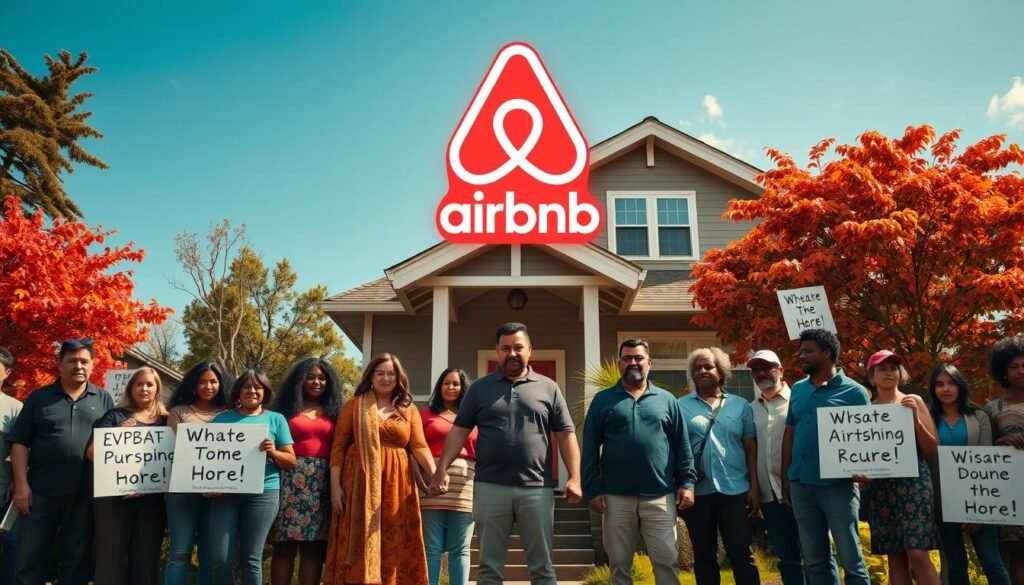
As the legal landscape surrounding Airbnb and short-term rentals continues to evolve, the influence of advocacy and opposition groups will likely remain a crucial factor in determining the future direction of the industry and its impact on local communities.
Future Trends in Short-Term Rentals
As the debate over Airbnb regulations and short-term rental laws continues, the future of the short-term rental industry is poised for significant changes. Industry experts foresee a shift in the legal framework, the emergence of hybrid rental models, and a reshuffling of Airbnb’s market position.
Potential Changes in Legal Framework
Governments at the federal, state, and local levels are expected to introduce new regulations to address the impact of illegal rentals on local housing markets. This may include stricter licensing requirements, increased enforcement, and the implementation of comprehensive zoning laws to ensure a balance between tourism and residential needs.
Emergence of Hybrid Rental Models
- The rise of “boutique hotels” and “vacation rental communities” that blur the lines between traditional hospitality and short-term rentals.
- Increased collaboration between Airbnb and local authorities to develop innovative compliance solutions.
- The growth of platforms that offer a mix of professionally managed and owner-operated rental properties.
Predictions for Airbnb's Market Position
Airbnb’s dominance in the short-term rental market may face challenges as local regulations tighten and alternative platforms gain traction. Industry observers anticipate a shift towards a more balanced market, with Airbnb potentially diversifying its offerings or focusing on specific segments to maintain its competitive edge.
| Trend | Prediction |
|---|---|
| Regulatory Landscape | Increased scrutiny and stricter laws governing short-term rentals |
| Business Models | Emergence of hybrid rental platforms and professional property management |
| Market Share | Airbnb’s dominance may diminish as new players and regulations disrupt the industry |
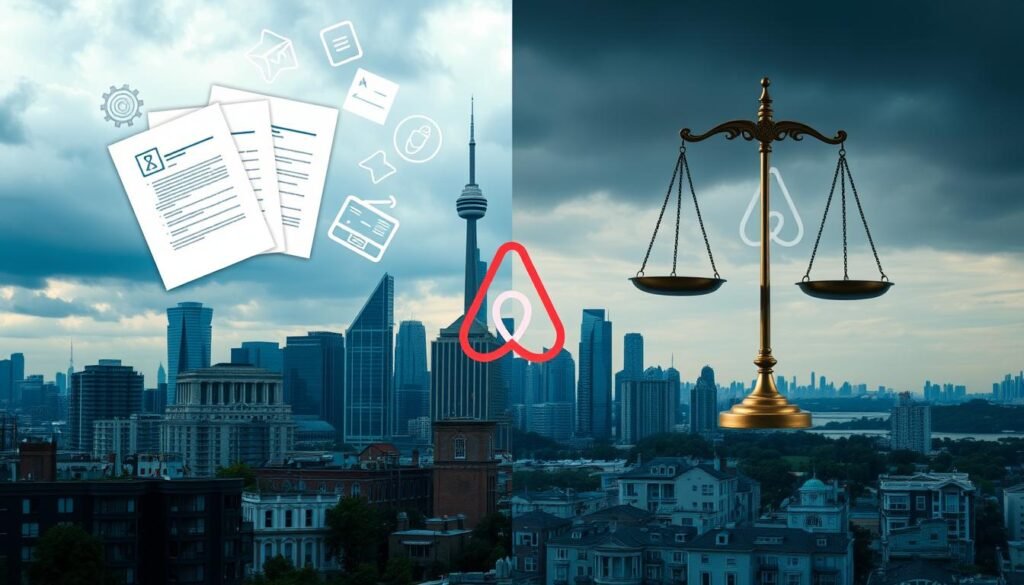
The future of the short-term rental industry is poised for significant transformation, driven by evolving Airbnb regulations, short-term rental laws, and the impact on local housing markets. As stakeholders navigate this complex landscape, adapting to these emerging trends will be crucial for both hosts and communities.
Technology's Role in Monitoring Rentals
As the ongoing debate surrounding rental enforcement challenges and Airbnb regulations continues, the role of technology in monitoring short-term rentals has become increasingly crucial. Local authorities and community stakeholders are exploring innovative solutions to address the legal disputes and compliance issues that have plagued the short-term rental industry.
Use of Data Analytics for Compliance
One prominent approach is the utilization of data analytics to enhance compliance efforts. By leveraging sophisticated algorithms and data-driven insights, authorities can identify patterns of illegal rental activities, track unlicensed listings, and target enforcement actions more effectively. This data-driven approach allows for a more proactive and strategic response to the rental enforcement challenges faced by communities.
Apps and Tools for Local Authorities
In addition to data analytics, local governments are increasingly adopting specialized apps and tools to assist in monitoring and enforcing Airbnb regulations. These technological solutions provide authorities with real-time information on rental activities, enabling them to promptly address any violations and ensure compliance with local laws. By leveraging these innovative platforms, communities can streamline their enforcement efforts and better protect the interests of residents and legitimate short-term rental operators.
Innovations in Tracking and Reporting
The evolving landscape of short-term rental regulations has also sparked the development of new tracking and reporting technologies. From automated systems that flag suspicious listings to user-friendly reporting platforms that empower citizens to report suspected violations, these innovations are empowering communities to stay vigilant and responsive in the face of ongoing rental enforcement challenges.
While technology offers promising solutions, the effective monitoring and regulation of short-term rentals remains a complex and multifaceted challenge. Striking the right balance between fostering a thriving sharing economy and addressing the concerns of local communities requires a collaborative approach involving all stakeholders, including policymakers, technology providers, and the short-term rental industry itself.
| Approach | Description | Key Benefits |
|---|---|---|
| Data Analytics | Leveraging sophisticated algorithms and data-driven insights to identify patterns of illegal rental activities and track unlicensed listings. | Enables more proactive and strategic enforcement efforts, targeting the root causes of non-compliance. |
| Specialized Apps and Tools | Adoption of technology platforms that provide real-time information on rental activities and facilitate prompt response to violations. | Streamlines enforcement processes and enhances the ability of local authorities to ensure compliance with Airbnb regulations. |
| Innovative Tracking and Reporting | Development of automated systems to flag suspicious listings and user-friendly platforms that empower citizens to report suspected violations. | Empowers communities to stay vigilant and responsive in addressing rental enforcement challenges. |
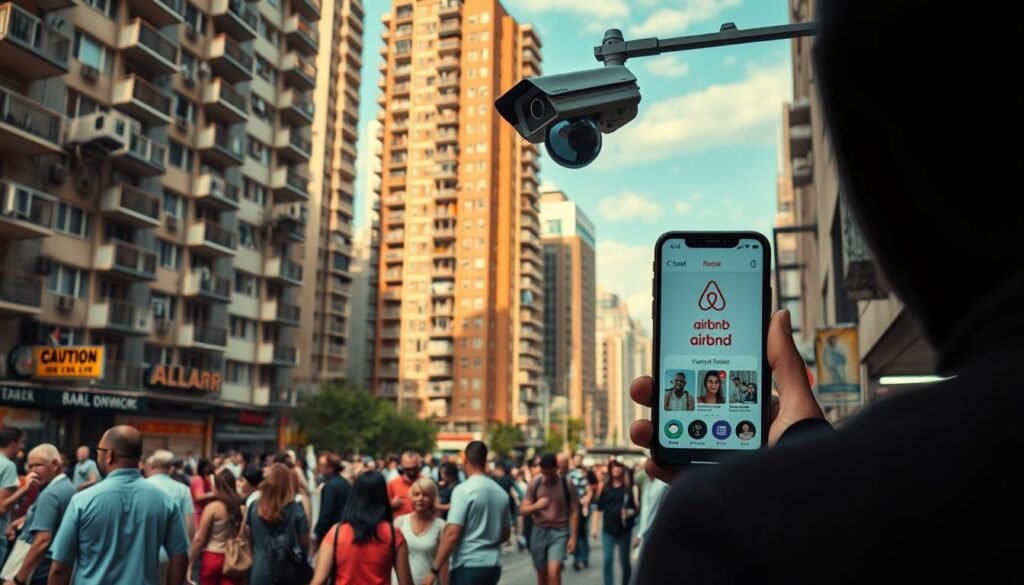
“The effective monitoring and regulation of short-term rentals remains a complex and multifaceted challenge, requiring a collaborative approach involving all stakeholders.”
Conclusion: Navigating the Controversy of Illegal Rentals
The ongoing debate surrounding illegal Airbnb rentals has highlighted the complex interplay between the desire for short-term rental opportunities, the enforcement of local regulations, and the need to balance the interests of hosts, guests, and communities. As we look to the future, it’s clear that navigating this controversy will require a multi-faceted approach that addresses the cases and consequences, Airbnb regulations, and short-term rental laws at play.
Summary of Key Issues
The central issues driving this controversy include the lack of clarity around Airbnb regulations, the impact of illegal rentals on housing affordability and local communities, the financial motivations of hosts, and the risks faced by guests staying in unlicensed accommodations. Resolving these challenges will require a collaborative effort between policymakers, industry stakeholders, and grassroots advocacy groups.
The Path Forward for Hosts and Communities
For hosts, navigating the legal landscape of short-term rental laws will be crucial to ensure they can continue to offer their services without facing hefty fines or the threat of eviction. Meanwhile, communities must work to strike a balance between supporting local tourism and preserving the character and affordability of their neighborhoods. Innovative policy solutions and open communication between all parties will be essential in this process.
Call to Action for Stakeholders
As we move forward, it’s imperative that all stakeholders – from Airbnb hosts and guests to local government officials and community advocates – engage in a constructive dialogue to develop balanced and effective Airbnb regulations. By working together to address the cases and consequences of illegal rentals, we can create a sustainable short-term rental ecosystem that benefits both the industry and the communities it serves.
FAQ
What is the definition of an illegal rental on Airbnb?
An illegal rental on Airbnb refers to a short-term rental that violates local zoning laws, housing regulations, or other applicable laws and ordinances governing the operation of vacation rentals and home-sharing platforms.
What are the legal penalties and consequences for Airbnb hosts engaged in illegal rentals?
Hosts who operate illegal Airbnb rentals can face significant legal penalties, including heavy fines, eviction, and long-term impacts on their ability to rent properties in the future. The specific consequences vary by location and the severity of the violation.
How have local governments responded to the rise of illegal Airbnb rentals?
Local governments have adopted a range of regulatory approaches to address illegal Airbnb rentals, including stricter enforcement, zoning changes, registration requirements, and collaboration with the platform to improve compliance. The goal is to balance the benefits of short-term rentals with the needs of local communities.
What are the key factors driving the growth of illegal Airbnb rentals?
The growth of illegal Airbnb rentals is driven by a combination of factors, including the financial incentives for hosts, the ease of listing properties on the platform, and the ongoing tension between the sharing economy model and traditional housing regulations.
How have high-profile legal cases involving Airbnb impacted the regulation of short-term rentals?
Prominent legal battles between Airbnb, local governments, and hosts have set important precedents and shaped the regulatory landscape for short-term rentals. These cases have highlighted the complexities of balancing the interests of hosts, guests, and communities.
What are the potential consequences of illegal Airbnb rentals for local communities?
Illegal Airbnb rentals can have significant consequences for local communities, including reducing the availability of affordable housing, disrupting the traditional hospitality industry, and straining public services due to the influx of tourists. These impacts often disproportionately affect lower-income residents.
How is Airbnb addressing the issue of illegal rentals on its platform?
Airbnb has implemented policies and initiatives to address illegal rentals, such as requiring hosts to comply with local laws, cooperating with authorities on enforcement, and improving transparency around rental listings. However, the platform continues to face challenges in self-regulation and balancing the needs of hosts, guests, and communities.
What global trends are emerging in the regulation of short-term rentals?
Globally, there is a trend towards more comprehensive regulation of short-term rentals, with countries and regions adopting various approaches, including registration requirements, limits on the number of rental days, and stricter enforcement measures. These efforts aim to balance the benefits of short-term rentals with the need to preserve affordable housing and maintain the character of local communities.
How are advocacy and opposition groups shaping the debate around Airbnb regulations?
Grassroots movements, community organizations, and industry groups are playing a significant role in shaping the policy landscape around Airbnb regulations. These groups advocate for stricter controls on illegal rentals, defend hosts’ rights, and influence public opinion, which in turn impacts the decision-making process of local authorities.
What are some of the innovative technological solutions being used to monitor and enforce short-term rental regulations?
Municipalities and regulatory bodies are leveraging data analytics, compliance tools, and other technological innovations to more effectively monitor and enforce short-term rental regulations. These include using data mining to identify illegal listings, developing apps and platforms to facilitate reporting and compliance, and exploring new methods of tracking rental activity.



